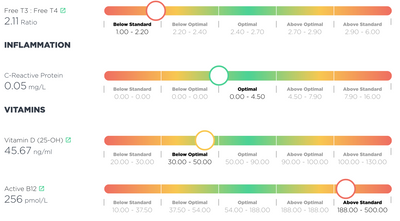
Nootropics improve your cognitive function in a variety of ways, depending on the substance you take. Any product that aims to boost brain abilities (e.g., concentration, critical thinking, memory) is referred to as a nootropic.
For instance, resveratrol – a potent nootropic – uses its antioxidative properties to improve memory and concentration. In one study, researchers found that resveratrol sharpens all cognitive functions.
Unfortunately, many people are unaware of the huge benefits that these substances can offer, especially for individuals at risk of mental decline (e.g., elderly).
In this article, we will cover 5 of the most potent nootropics to boost mental and cognitive abilities.
The benefits of nootropics
Improved focus
Many people complain of distractibility and lack of focus, especially after spending long hours performing the same task.
Obviously, taking a break and let your eyes, ears, and brain get some rest is the right thing to do. However, this may not be an option if you work in a highly competitive field.
In this case, nootropics will help you get through the day by activating certain areas of the brain that control memory and concentrations (e.g., hypothalamus).
Less anxiety
When it comes to any type of performance, anxiety is your number one enemy.
When anxious, you will experience slowed reaction time, poor decision-making, and lack of focus. The good news is that nootropics regulate the levels of neurotransmitters in your brain to decrease your risk of anxiety, depression, and other psychiatric disorders.
More energy
Along with the other benefits, nootropics boost your energy levels.
As a result, you will benefit from a:
- Faster reaction time
- More physical strength
- Fewer bouts of fatigue
Evidence-based nootropics
1. Citicoline
Citicoline is a naturally occurring compound that is part of your cell membranes. This ingredient is very common in nootropics due to its brain-supporting properties.
For instance, Alzheimer’s disease is characterized by low levels of choline, which negatively impacts memory and recall. In order to produce acetylcholine, your body will break down cell membranes, further damaging your cognition.
Citicoline may prevent this breakdown without causing any serious side effects.
Here are some studies that support the positive effects of citicoline:
- 1 meta-analysis of randomized controlled trials found that patients with vascular cognitive impairment experience significant improvement after taking citicoline supplements.
- 4 small clinical studies found that healthy middle-aged individuals undergo a surge in memory and concentration abilities after intake of citicoline.
- 2 observational studies found that citicoline is quite beneficial for Alzheimer's patients.
2. Vitamin D
Vitamin D supplements can potentially improve your cognitive function through the optimization of neuroplasticity and neuronal connections. You will experience improved concentration, reflexes, and reasoning.
Moreover, this vitamin helps with depression and burnout, which are very common in people aged between 18 and 45.
While sunlight exposure is the primary way to intrinsically synthesize vitamin D, you will most likely need supplementation to reduce your risk of developing these disorders.
3. Caffeine
Caffeine is perhaps the most famous nootropic in the world. It is found in coffee and tea and serves as a central nervous system stimulant. Consumed in moderate amounts, caffeine does not lead to any serious side effects.
In fact, the vast majority of energy drinks contain caffeine, along with other stimulants.
The Food and Drug Administration (FDA) advises people to drink less than 400 milligrams (mg) of caffeine per day. For reference, this is the amount found in 4–5 cups of coffee.
Another way to get caffeine into your system is by taking supplements. However, make sure to stick to the recommended dosage to avoid a caffeine overdose.
On the molecular level, caffeine blocks the action of adenosine. This amino acid increases gradually during the day, which makes you feel drowsy and sleepy.
Blocking the action of adenosine would produce the opposite effects. Caffeine’s second mechanism of action is to increase the concentrations of dopamine and norepinephrine in the brain.
As a result of these physiological effects, caffeine makes you feel aroused, focused, alert, and sharp when it comes to cognitive functions.
In general, caffeine becomes effective after a very short time. Researchers estimate that 20 minutes after drinking your coffee is enough for caffeine to take action.
4. Beta-alanine
Beta-alanine is a non-essential amino acid found in your brain and muscle cells. With histidine, beta-alanine forms a compound known as carnosine. The function of this compound is to lower the concentration of acidic molecules during exercise. After binding to histidine, beta-alanine forms carnosine, which increases the levels of the latter in the muscles and brain. The action of carnosine is what gives beta-alanine its nootropic properties. Carnosine has been shown in a number of studies to be very effective at reducing episodic anxiety and depression in numerous models of stress.
Hoffman and colleagues found that 4-weeks of beta alanine supplementation in young, healthy soldiers supplementation directly led to enhanced marksmanship and rate of target acquisition, sustaining tactical performance suggestive of improved psychomotor performance. Furthermore,
5. Magnesium
According to research, low magnesium levels make you prone to:
- Depression
- Anxiety
- Bipolar disorder
- Other psychiatric diseases
One analysis concluded that individuals over the age of 65 who have magnesium deficiency are at greater risk of developing depression.
In fact, some experts believe that magnesium deficiency may be the primary culprit behind the surge of depression cases in the modern world.
Scientistic found that magnesium supplements improve your mood, concentration, memory, and mental status.
In one randomized controlled trial, researchers gave participants 450 mg of magnesium every day. This resulted in mood improvement that is comparable to the intake of antidepressants.
Takeaway message
Nootropics are substances with a unique chemical composition that allows them to interact with your brain cells and optimize their function. Taking nootropics in the recommended dosage can offer you a myriad of benefits.
We hope that this article helped understand the value of nootropics and the scientific evidence that supports their effectiveness.

